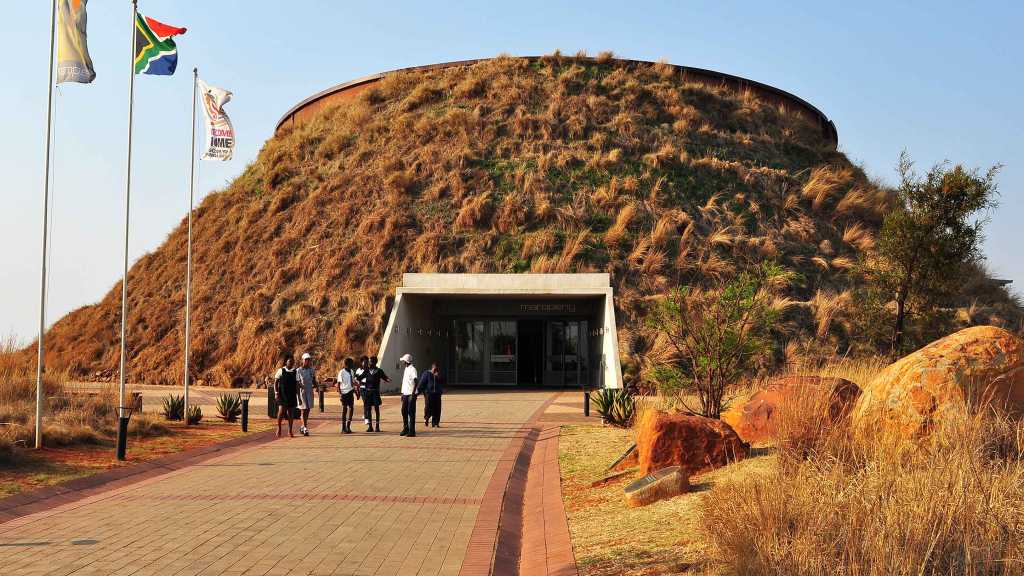The Cradle of Humankind is a world heritage site and occupies a vast valley of caves and fossils .
Dating back more than 3 millions years including those of Sterkfontein, where nearly one-third of the fossils of hominids have been discovered, including the Australopithecus africanus Mrs. Ples in 1947 and those of Homo Naledi in 2013.
Gauteng is the former Republic of Transvaal. It’s the economic heart of South Africa which concentrates almost 25% of the total population of the country. Undoubtedly, this region is worth a visit because nowhere else can one soak up the unique history of South Africa: the Great History of Humanity with its cradle, its gold rush and its less glorious past of young democracy… South Africa vibrates in Gauteng, the modern, the dynamic, the creative...
Advice:
- If you only have to spend 2 days, apprehend the recent history of the country by visiting the Apartheid Museum, Soweto then discover Jozi (or Jo’burg) the vibrant and its city centre, a real open air museum!
- If you have a little more time (4 days), push to the Cradle of Humankind and Pretoria by day or get away from the city by taking a break away from its turpitude in the Magaliesberg mountains!
- If you have visiting with children:
- The Cradle of the Humankind, with the Maropeng complex will amuse them at the time as instructing them on the appearance of life on earth.
- In the Magaliesberg you can fly over the peaks and slide on the zipline via the Magaliesberg Canopy Tour or take the cable car to have a breath-taking view of the Hartbeespoort Dam!
South Africa, the 'rainbow' nation.
South Africa is so diverse you feel like you are visiting several countries in one trip!
With grandiose and various landscapes (mountains, « bush », beaches, forests, plains, desert), a pleasant climate in all seasons, an abundant and diversified fauna and flora including the “Big Five”, a population with the most composite ethnic groups, South Africa accumulates important natural wealth. Also note among its assets: quality of the hotel sector, services, road network, means of transport, rich and varied gastronomy, excellent wines, favourable exchange rates, 21 national parks and many private reserves, a multitude of activity throughout the country…
When to go?
South Africa has this peculiarity of presenting a wide variety of climates: Mediterranean, subtropical or temperate depending on the region with a high rate of sunshine everywhere (watch out for sunburn!)
South Africa can be visited all year round with more favourable periods depending on interests:
-
June, July and August (South African winter) for animals and therefore preferably the North of the country.
-
September and October: best times for flowers (Namaqualand) but very good for game drives as well.
-
From November to March (South African summer): best time to enjoy the South and East of the country, beaches of the Cape and the Indian Ocean. The Garden Route is particularly appreciated in February: the weather is nice; the temperature of the water is pleasant.
-
April and May: very pleasant autumn with always nice days in Cape Town and the resumption of the animal season.
Formalities:
The passport must include two blank pages and still be valid for 30 days after the expected date of exit from South Africa.
French nationals are exempted from prior visas. A 90-day residence permit will be issued at the border on entry into South African territory.
For other nationalities, inquire on a case-by-case basis with the competent authorities of their country of origin.
For any minor child: a multilingual extract of birth certificate (or an unabridged birth certificate translated into English - certified translation) is required to enter and leave South Africa (in the case of a child traveling with his 2 parents). Please consult the official sites for more information about all the requested documents according to your case.
Health:
No vaccinations are required for entry into South Africa. However, it is advisable to check the updating of your usual reminders and vaccinations as for any country.
Anti-malarial treatment is recommended (see your doctor).
Currency:
The Rand is the official currency of South Africa (symbol: ZAR). Credit cards are accepted everywhere and distributors are easily available for cash withdrawal. Travellers’ checks in euros are also accepted in banks and some hotels.
